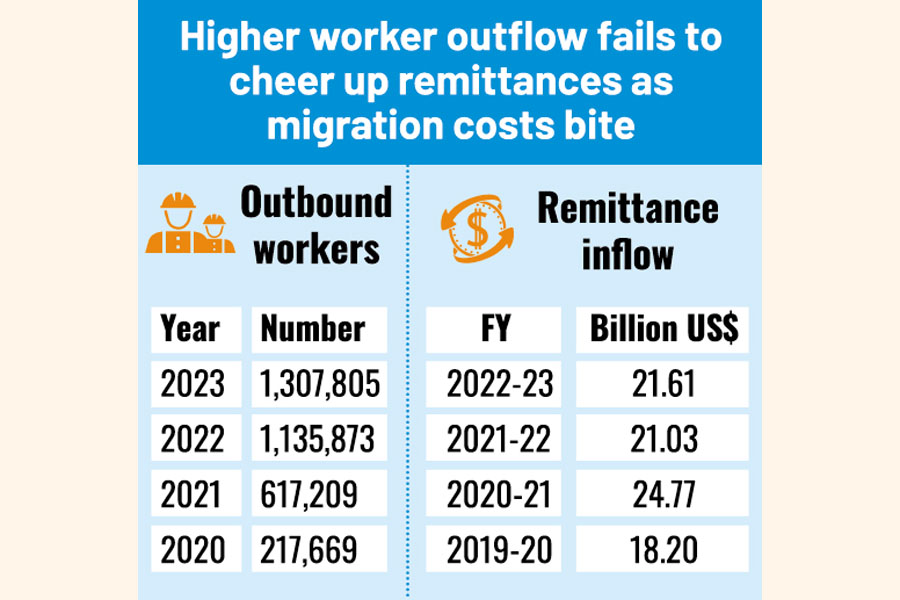
Published :
Updated :

Bangladesh sent a record-breaking 1.3 million workers abroad in 2023, surpassing the 2022 figure of 1.14 million. Despite this surge, unresolved issues like high migration costs, a lack of skilled labour and informal money transaction channels like hundi continue to cast a shadow over the sector.
The data released by the Bureau of Manpower Employment and Training (BMET) shows that the upward trend in worker deployment has not translated into a proportional increase in remittances.
Bangladeshis working abroad sent nearly $19.60 billion home in the January-November period of 2023, as per the Bangladesh Bank statistics.
Industry insiders pointed to fraudulent practices by some recruitment agencies as a major concern. Many workers end up without promised jobs, despite incurring high migration costs.
Besides, they said the country lags behind in sending skilled workers, contributing to the lower remittance income compared to some neighbouring countries with smaller outbound worker numbers.
However, Expatriates' Welfare and Overseas Employment Minister Imran Ahmad recently expressed optimism for further growth in 2024, but admitted the urgency for a paradigm shift.
The minister called for prioritising skilled workers to increase remittance inflow and urged a concerted effort to develop and deploy the workforce.
The minister elaborated on the initiatives taken by the government to promote safe and quality migration.
According to the World Bank and KNOMAD's "Migration and Development Brief 39", Bangladesh will rank seventh among lower-middle-income countries in terms of remittance income by the end of 2023, trailing behind India's projected $125 billion.
Ali Haider Chowdhury, secretary general of the Bangladesh Association of International Recruiting Agencies (BAIRA), said most of the outbound workers are Middle East-centric.
"We need to explore non-traditional markets with job opportunities," he said, calling for "proper policy" to facilitate diversification.
Official data shows Saudi Arabia absorbing the most Bangladeshi workers in 2023, with 498,464 permits issued. Malaysia followed with 351,980, while the UAE, Oman, Qatar and Singapore also drew significant numbers.
Shakirul Islam, chairman of the Ovibashi Karmi Unnayan Program (OKUP), underscored quality migration over mere quantity.
Mr Islam raised concerns about continuing fraud incidents in traditional markets, particularly Saudi Arabia and Malaysia.
"Many workers pay exorbitant fees - Tk 400,000 to Tk 500,000 for Saudi Arabia and Tk 300,000 to Tk 400,000 for Malaysia - for non-existent jobs," Mr Islam said. "These inflated costs, often linked to fake visas, hinder sector development despite record worker numbers."
He advocated for combating the malpractices, citing OKUP reports of fake work visas issued to Bangladeshis in these countries.
Official data on outbound Bangladeshi workers paints a complex picture, leaving the remittance inflow in a puzzle.
While worker deployment has steadily increased since 2018 (734,181), remittance inflows have not followed the same trajectory.
The central bank reports show 2022-23 inflows at $21.61 billion, followed by $21.03 billion in 2021-22, indicating a plateau.
arafataradhaka@gmail.com


 For all latest news, follow The Financial Express Google News channel.
For all latest news, follow The Financial Express Google News channel.